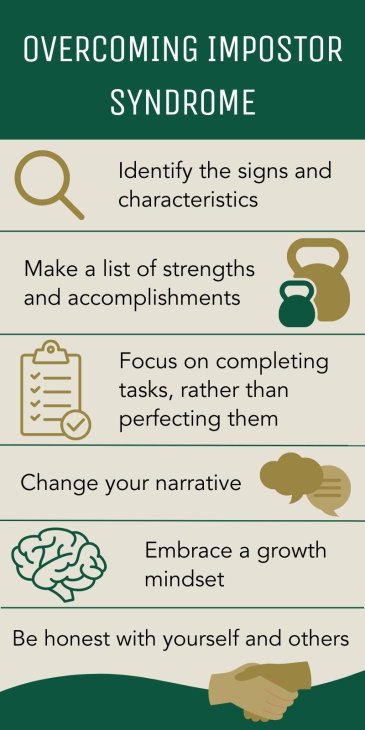
Beginning a new school year, job, or change in an academic or professional setting can provoke a multitude of feelings, anxiety being one of them. It may be tied to believing that you’re inexperienced in or undeserving of this next step, even if you’re well-equipped.
What is impostor syndrome?
This feeling is called impostor syndrome (IS). Impostor syndrome is a psychological phenomenon that can affect anyone, even high achievers. It is characterized by persistent self-doubt, the fear of being exposed as a fraud, and feelings of inadequacy, despite evidence of competence and success.
Rather than acknowledging their capabilities or efforts, someone who struggles with impostor syndrome will often attribute their accomplishments to external causes, such as good timing or luck.
While it can be challenging to overcome if not identified or confronted, this phenomenon can also be quite isolating. According to the American Psychological Association, a systematic review found that people experiencing IS often perceive themselves to be the “only one” having those feelings.
However, if you feel this way, know that you’re not alone. Up to 82% of people face feelings of impostor phenomenon. Even the most successful and accomplished people have felt uncertain of themselves at times!
History of impostor syndrome
Also commonly known as fraud syndrome, perceived fraudulence, and impostorism, IS was first described by psychologists Pauline Rose Cance and Suzanne Imes in a 1978 study. After observing 150 successful women, the researchers noticed that the women frequently confessed to feeling unworthy of their success, despite contradicting evidence.
Following the term’s original publication, IS has been referred to in scientific literature and formal and informal media.
Characteristics of impostor syndrome
Although impostor syndrome is a commonly experienced, researched, and pervasive phenomenon, its true prevalence remains unknown. It also has no formal medical definition. Nevertheless, impostor syndrome can be summarized through six characteristics that may or may not be present in an individual with IS.
These characteristics include:
1. Impostor cycle
The impostor cycle occurs when individuals with IS face an achievement-related task, such as an assignment, duty, or obstacle. Their initial response to this task may either result in over-preparation or procrastination.
Over-preparation
Those with IS may feel as if they need to work harder than others to achieve the same goal or complete the same task. Since they falsely perceive needing to put in more effort, they are an impostor.
Procrastination
Those with IS may avoid participating or completing a task because they feel as if doing so may expose their incompetence. For example, someone with impostor syndrome may wait until the last minute to complete a project because they feel ill-equipped.
Completing the task
Although there is a brief sense of success once a task is complete, people with IS cannot fully internalize their accomplishments. This likely leads them to experience anxiety, fear, fraudulence, and other pathology leading to the following task.
2. Perfectionism
Perfectionism is a continuum of perfectionist and hyper-competitive behaviors that occur when practically unattainable goals are self-imposed by those with IS. Hence, these unrealistic benchmarks drive a feedback loop that states that one needs to be the best at what they do.
3. Super-heroism
Intrinsically related to the need to be the best, super-heroism is the tendency to over-prepare for tasks to appear more than capable of completing them. For example, a student who struggles with impostor syndrome may dedicate their entire day to studying if they find out that they have a pop quiz in their last class.
4. Atychiphobia
The fear of failure, or atychiphobia, manifests when an individual with IS faces an externally or internally imposed achievement-related task. As a result, they may experience the fear of receiving negative feedback or humiliation if they fail or do not perform well on a particular task.
5. Denial of competence and capability
Those with IS tend to discount their experience, skills, intelligence, and natural talents. They may relate their successes to an external influence and internalize their failures. As a result, they do not think that they can complete a task without these factors.
6. Achievemephobia
Achievemephobia (fear of success) can be understood as the internalization of failures and difficulty in internalizing achievements. If someone with IS does achieve a goal, they may set higher expectations of themselves for their next assignment or increase their workload.
What causes impostor syndrome?
According to the National Library of Medicine, the etiology of impostor syndrome is multifactorial and can be categorized into the following:
A standalone syndrome
IS may result from any of the six characteristics mentioned above, which all relate to broken meta-cognitive processes. Meta-cognitive processes can be defined as the process of thinking about one’s own thinking and learning.
A manifestation of other comorbid mental health disorders
This psychological phenomenon may be a presentation of various mood and personality disorders. Past studies have identified depression and anxiety as frequently comorbid with impostor feelings.
Who struggles with impostor syndrome?
Various reports on the epidemiology of impostor syndrome exist. However, the findings aren’t significant enough to make definitive statements on the psychological phenomenon’s biostatistical factors (prevalence, demographic information, incidence, etc).
According to Harvard Business Review, around one-third of young people struggle with IS and 70% of people will experience it at least once in their lives. Reports have also found that impostor syndrome is more common in females than males and in marginalized groups.
__________
Who are you called to be?
Pursue your purpose at PLNU.
__________
The impact of impostor syndrome
Intrapersonal
Contrary to their desire to succeed, those with IS may end up sabotaging their own success. This can be through working twice as hard to prove themself or obsessing over minor mistakes.
According to Frederik Anseel, a professor of organizational behavior at Ghent University in Belgium, the fear that impostor syndrome engenders can result in “a persistent state of physical and emotional depletion.” This fear can prevent individuals from entering new opportunities, such as starting a new career or negotiating a better salary, due to feeling unqualified or undeserving.
Studies have also found that there is a harmful association between impostor feelings and job satisfaction and job performance among various employee populations. Hence, IS also correlates with a decrease in striving, leadership interest, and career planning among students and working professionals.
Interpersonal
While impostor syndrome is deeply intrapersonal, it affects more than just the person experiencing it. Over time, the over-exertion of energy may result in burnout, which is the most common consequence of impostor syndrome. According to Forbes, the effects of burnout are tangible and widespread, costing the economy almost $190 billion annually.
This phenomenon can strain relationships, too. It can be difficult for someone experiencing IS to connect with their peers because they’re scared of being “exposed” as someone unqualified for their position.

How can I overcome impostor syndrome?
IS is a collection of feelings of inadequacy, so it can manifest differently from person to person. However, there are ways to combat it. Here are six steps that you can take to overcome impostor syndrome.
1. Identify the signs and characteristics
One of the best ways to manage impostor syndrome is to address the cognitive distortions (listed above) associated with it. See if you can identify any common characteristics of impostor syndrome in your own behaviors or thought processes. This will make it easier for you to recognize when and how they appear.
2. Make a list of your strengths and accomplishments
People who struggle with IS tend to brush off their successes. Writing down your accomplishments will visually display the great qualities and skills you have. If feelings of IS start bubbling up, reread this list. It can remind you of your unique and valuable qualities.
External, concrete reminders are also helpful ways to combat impostor syndrome. For example, if you receive a message with positive feedback from a colleague or peer, save or print it out to look back on.
3. Focus on completing tasks rather than perfecting them
Jumping into a task with the intention of making it perfect can increase one’s likelihood of being self-critical. Adjusting your standards for success can make it easier to internalize your accomplishments. There may not be a perfect way to complete a task, and that’s okay!
Shifting from an external to an internal locus of self-worth and self-compassion can help individuals let go of perfectionism. An internal locus of control is an individual’s perception of the underlying causes of the events in their lives.
4. Change your narrative
Positive self-talk increases your confidence and combats negative narratives and judgments. For example, a 2019 study found that students who recited a self-affirmation before giving a presentation experienced less performance anxiety than their peers who did not. A 2020 study also found that people who engaged in positive self-talk developed effective strategies to cope with their mental stress and emotions.
The next time you find yourself thinking “I could have done better”, alter it into a statement with more self-compassion, such as "I did my best."
5. Embrace a growth mindset
A growth mindset entails believing that you can improve your skills and abilities by continuously learning, embracing change, and viewing obstacles as opportunities for growth. Individuals who struggle with IS tend to have a fixed mindset, and assume that their abilities are limited and minimally subject to improvement.
By reframing your thinking, you’ll recognize that you can acquire and improve your skills and abilities. Using feedback and learning from your mistakes will motivate you to pursue new goals. It can also decrease feeling threatened by the success of others.
6. Be honest with yourself and others
When you are experiencing self-doubt, reach out and talk to people you trust. While they'll show you how your fears are unfounded, they'll also remind you of your strengths and value. Connecting with empowering peers and communities provides support, validation, and empathy.
Learning to combat feelings of IS doesn’t mean that they won’t show up again. However, being proactive in identifying it can help you
Help others see their value
We all long to be heard and understood. You can be the one to make that difference. If you’ve experienced impostor syndrome yourself, or seek to help others overcome it, check out PLNU’s Bachelor’s in Psychology and Master’s in Clinical Counseling programs.